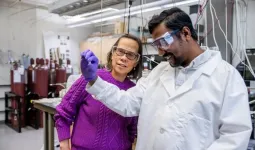A $3.8 million grant from the National Institute of Environmental Health Sciences, a division of the National Institutes of Health, will fund planning for the Southwest Center on Resilience for Climate Change and Health, or SCORCH, at the University of Arizona fund planning for the Southwest Center on Resilience for Climate Change and Health, or SCORCH, at the University of Arizona Mel and Enid Zuckerman College of Public Health. The center will focus on research and programs to help communities in Arizona and other hot, dry geographic regions adapt to climate-driven health threats.
Hotter and drier climate conditions are driving a range of health challenges for more than 2 billion people who live in arid lands in Arizona and around the world. SCORCH will focus on cross-disciplinary research and programs to help vulnerable communities in Arizona and other hot and dry geographic regions adapt to climate-driven health threats.
“Climate change is happening right now. You can see the effects in the United States and all over the world,” said Kacey Ernst, PhD, MPH, professor in the Zuckerman College of Public Health and one of three faculty leads on the project. “In Arizona, we have record-setting heatwaves, wildfires, droughts and dust storms, and all of those threaten health in different ways. We have to find opportunities to adapt, safeguard human health and build resilient communities because climate change is transforming our environment. By working together across disciplines and with community members, we can figure out how to navigate these challenges.”
Co-principal investigators Ernst, Mona Arora, PhD, assistant research professor in the Zuckerman College of Public Health, and Joe Hoover, PhD, assistant professor of environmental sciences in the College of Agriculture, Life and Environmental Sciences, envisioned SCORCH as a collaboration that will serve a range of communities, including low-resource urban and rural populations, Indigenous peoples and Spanish-speaking groups.
SCORCH will provide planning, coordination and resources for three research focus areas: health impacts of extreme weather events; forecasting and early warning; and adaptive responses to the built environment.
Two research projects are funded as part of the three-year planning period. One project, led by Melissa Furlong, PhD, assistant professor in the Zuckerman College of Public Heath, is designed to examine how exposure to extreme heat during pregnancy impacts attention-deficit/hyperactivity disorder and learning outcomes in children. The other project, led by Shujuan Li, PhD, associate professor in the College of Architecture, Planning and Landscape Architecture, focuses on understanding the health trade-offs in greenspace planning decisions and developing a tool that can predict the health outcomes of contrasting greenspace designs.
SCORCH activities will focus on three key pillars:
Systems Thinking – SCORCH will investigate how existing support systems, infrastructure and programs can respond to climate change using a cross-disciplinary approach that reaches across organizations and expertise to find solutions. A flexible and integrated data core will be developed to facilitate this process and tackle complex problems.
Health Equity – SCORCH will work with partners to evaluate needs and conduct collaborative research that engages the community with the science. In responding to climate threats, equity will be prioritized by cultivating relationships with local and global partners in arid regions.
From Science to Solutions – SCORCH will develop responsive and resilient systems that can adapt to climate impacts. In collaboration with community organizations, the team will connect research knowledge with practical implementation. They will foster partnerships with the private sector to scale solutions and build relationships with policymakers to guide action and lead adaptation.
The broader university community will be engaged through seed grant programs and workshops to develop innovative research and solutions. The center’s scientific studies will build on a foundation of data to provide benchmarks and insights that will guide decision-makers to prepare for the complex health challenges posed by climate change and protect communities.
“I’m very pleased and proud of Dr. Arora and Dr. Ernst for their work at the forefront of climate change response and public health,” said Iman Hakim, MD, PhD, MPH, dean of the Zuckerman College of Public Health, “We have been working collaboratively for several years with other researchers and community health providers to respond to these climate shocks such as heatwaves, droughts and wildfires, and now we’re able to build on that work to help communities develop resilience. This is the work of the future. Climate change is impacting all of humankind.”
In addition to researchers Furlong and Li and lead investigators Arora, Hoover and Ernst, who also serves as co-Director for the Bridging Biodiversity and Conservation Science program at the university’s Arizona Institute for Resilience, the SCORCH team includes: Zuckerman College of Public Health researchers Paloma Beamer, PhD, professor, interim associate dean of community engagement and BIO5 Institute member; Dean Billheimer, PhD, professor and member of the BIO5 Institute; Chris Lim, PhD, assistant professor, and Yiwen Liu, PhD, assistant professor. In addition to Li, other College of Architecture, Planning and Landscape Architecture collaborators include Ladd Keith, PhD, assistant professor, and Mackenzie Waller, MA, MLA, with Cristian Roman-Palacios, PhD, assistant professor in the UArizona iSchool, rounding out the UArizona research team. Huaqing Wang, PhD, assistant professor in the College of Agriculture and Applied Sciences at Utah State University, is also collaborating on the center.
This work is funded by the National Institute of Environmental Health Sciences, a division of the National Institutes of Health, under award no. 1P20ES036112-01.
END




